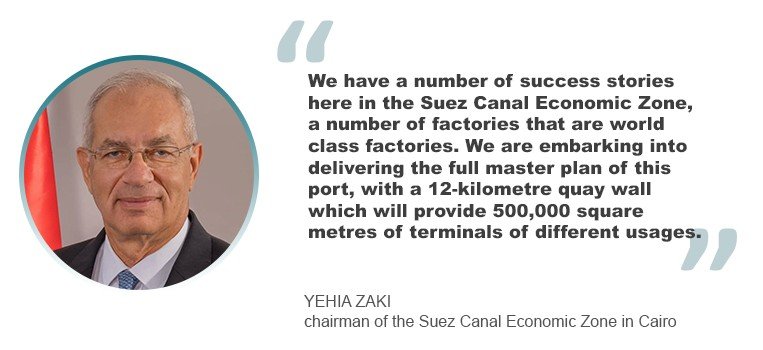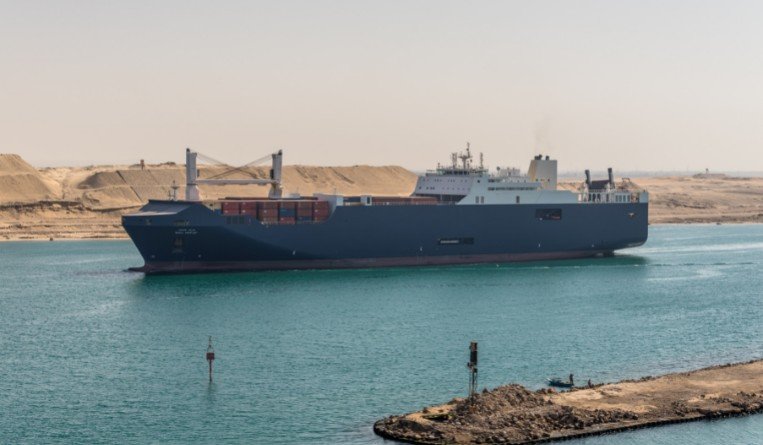Work on improvements to boost the capacity of the Suez Canal has started, a recent Expo Dubai seminar was told.
Long term, what the Egyptian authorities want is for the Suez Canal to be more than just a money-generating waterway, but a business destination in its own right. Authorities want it to be a promising investment area around the global trade route.
The seminar was as much about repositioning the canal as an economic zone over time as the canal’s rebound following the Ever Given blockage earlier this year.
That latter goal has an early and practical start, with plans by the Suez Canal Authority for an expansion project in the southern part of the canal where expansion, deepening and duplication works will create space for six extra vessels and increase the safety rate by 28%, Osama Mounier Mohamed Rabie, chairman and managing director of the Suez Canal Authority, said via a recorded presentation.
Work is also being done on the rest of the agenda.
The Sokhna integrated zone is south of the entrance to the canal and only 120 kilometers from Cairo and its 18 million consumers, who are easily reached by a modern six-lane highway. This already impressive facility is at once port and zone and covers 210 square kilometres, some of it greenfield. The port, at 23 square kilometres, is the largest bay area in Egypt, said Yehia Zaki, chairman of the Suez Canal Economic Zone (SCEZ).
“We have a number of success stories here, a number of factories that are world class factories,” said Zaki. “We are embarking into delivering the full master plan of this port, with a 12-kilometre quay wall which will provide 500,000 square metres of terminals of different usages.”
On the northern end of the canal, the Mediterranean Sea end, the SCEZ is working on a 64-square kilometer greenfield industrial area which will feature the “highest technology, infrastructure requirements and port performances,” said Zaki.

“We have completed five kilometres of quay wall and are preparing the terminal,” he said, adding that in less than 18 months from now, the terminals will be in full operation. Backing up the hardware are some very good incentives, such as zero customs duty and VAT and a seven-year corporate tax cut.
There will be more in the future, he said, identifying five areas for future action. These address ecosystem readiness, regulatory framework, financial incentives, the service levels provided and cost positioning. “We are working on each and every one of them,” said Zaki.
Targeted industries include manufacturing, such as tires, electric batteries, pharmaceuticals and automobiles. “We have already identified companies,” said Zaki.
The statistics for the zone, the waterway and its onshore facilities and business areas are impressive, Zaki said. Some 18,000 ships per year go through the canal, meaning it sees 12% of international trade and a tenth of the world’s seaborne trade. “This figure is going higher this year,” said Zaki. The SCEZ operates six ports, three on the Mediterranean coast and three on the Red Sea, as well as four industrial zones.
These and their connections to Egypt and its more than 100 million consumers and a growing GDP of US$350 billion are very much part of the SCEZ’s pitch to foreign investors. “(We’re) well-connected domestically,” said Zaki.
While Egyptian authorities believe the canal could serve the rest of Africa as well as it has served Egypt, that goal remains out of reach. Egypt’s immediate neighbours, Libya, Sudan and South Sudan, are all conflict-ridden, and its own relationship with the Middle East is fraught.
There are also problems of infrastructure. Railways frequently don’t connect internationally, meaning a lot of hope has been put in the Cairo to Cape Town highway – also known as the Cape to Cairo Road and the Pan-African Highway. Parts of this 10,000-kilometre road are already constructed, but significant sections remain unpaved, and there is a debate about when the road will actually be completed. Without clear leadership driving it forward, projected completion dates, one of which is as soon as the end of 2024, well might slip further back.
Michael Mackey



